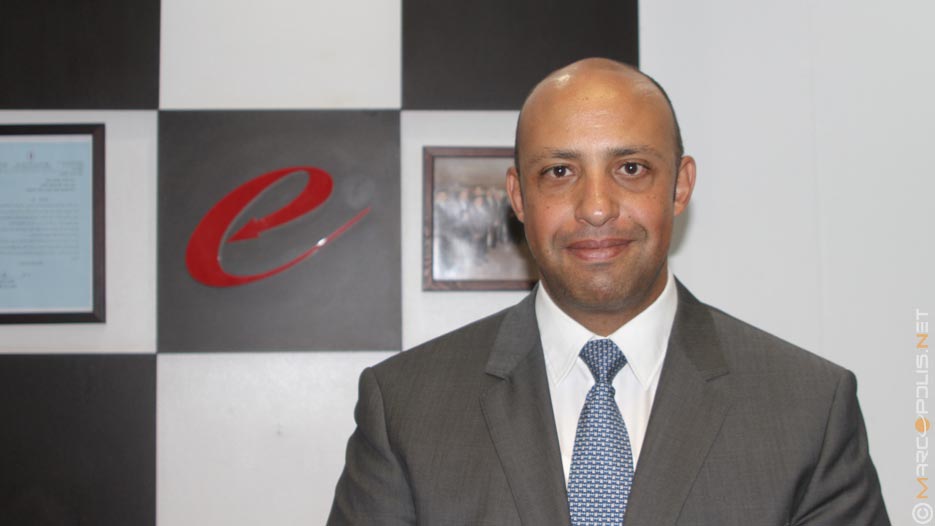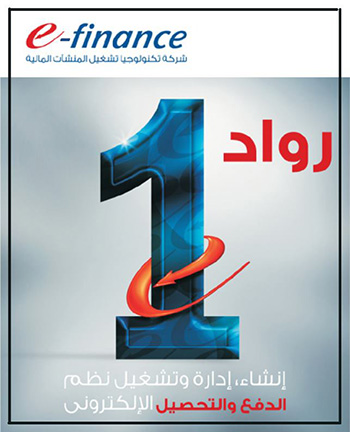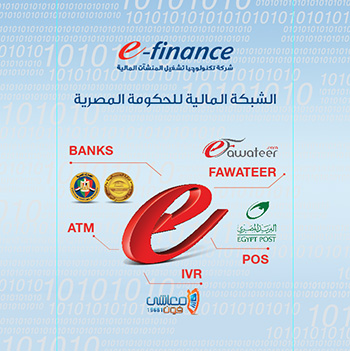“e-payment sector in Egypt has enormous potential,” says e-finance Egypt
“e-payment currently has enormous potential and it is expanding. When we started in 2005, e-payment did not even exist and now it is part of the country’s future strategy, which was announced by the Minister of Telecommunication few months ago,” explains Haithem Trabeek, Strategy & Business Planning Director of e-finance.
Interview with Haithem Trabeek, Strategy & Business Planning Director of e-finance

To start with, how would you evaluate the e-payment sector in Egypt?
e-payment currently has enormous potential and it is expanding. When we started in 2005, e-payment did not even exist and now it is part of the country’s future strategy, which was announced by the Minister of Telecommunication about 6 months ago. In fact, e-payment by itself as a concept is certainly booming, but it does have some issues that we need to deal with. Basically, I am referring to the issue of regulation. We have very good regulations for cash and cheques as payment methods, but not for e-payment. We do not yet have very firm regulations in this area.
I see a very good future in terms of the demand for e-payment throughout the country because we have a very high population and a lot of people use technology without even noticing it. For example, they nearly all use mobiles, ATMs, the internet, etc., and all of these can be a media for making e-payments. As just mentioned, what is lacking here is the regulation, but I think the Central Bank of Egypt is in the process of issuing a very valid regulation and, I would say, a very powerful regulation and I hope that it will not be long before the whole e-payment market becomes more open, more mature, much clearer and more transparent.

Please tell us the story of e-finance and how you became the leader in the e-finance market?
We started the company in 2005. I would call myself a co-founder because it was only me and the CEO to begin with. We now have 700 employees spread all over Egypt. We started with a concept that was new at the time, namely, of out-sourcing for the government’s projects. The first project that we started out-sourcing with was the electronic payment hub for the Ministry of Finance. We built this project and are still operating it now. That was one of the largest projects that we started out with.
The second project we worked was the Treasury Single Account, which is a law that was issued but which could not be in place without having the technology to apply it. We built this project and we operate it, although it is actually run by the Ministry of Finance due to the nature of the system.
The third project, which we are very proud of, is the pension project. This project facilitates payment for 6 million pensioners all over Egypt and allows them to withdraw their pension from any post office, from any social security office and from any ATM in Egypt. Previously, the pensioners had to go to a specific office on a specific day to get their pension. So this is the largest project in the EMEA region concerning payment for citizens. The fourth and last project, which we had last year, is the fuel subsidy card system, which has the aim of rationalising the use of fuel products like diesel and so on.
We now operate throughout Egypt and have 27 offices in all governorates to support all our projects. Most of our employees are from their local government offices. We are proud to be the leader in the transaction processing arena, with a specific focus on electronic payments in our service portfolio.
So you primarily work with the government. Do you have any other international partners or clients, or are you looking for any? Do you have any plans to expand regionally? What is your strategy?
To sum up, we offer three competitive advantages: we have infrastructure, we have a knowledge of the government environment and a knowledge of the government accounting system and finance system.
As I mentioned, we are the market leader and we have in fact gone beyond the market because our capacity is now much greater than the Egyptian market can absorb. For example, we have a certified card centre that is responsible for issuing cards, and its capacity is about 4.5 million cards per month. However, the entire banks cards population in Egypt is 12 million, so as you can see, our capacity is actually expanding far beyond what the market can absorb.
As a result, our strategy for this year and the next two years is to look for a very strong partnership to enable us to move to the Middle East and Africa, to leverage our experience in the government projects and to leverage our experience in implementing and running large-scale government projects.
Could you perhaps briefly sum up your major competitive advantages? Why should those international companies looking for a partnership choose you? Why and where do you stand out?
We stand out due to the experience we have gained over the last ten years. Our experience is very niche. I can clearly say that we do not have a competitor in the market in Egypt. I’m not talking about technology here because anyone can invent it. I’m not talking about ideas because ideas can be thought up anywhere. What I’m talking about is the knowledge that we have built up with our engineers, the knowledge that we have of the specific government projects and that we have built up over the past ten years and which can’t be found anywhere else in Egypt.
We also have the infrastructure that we have developed over the past five years so that we now occupy a very powerful position. For example, we have a pension office New Valley governorate in the west desert. This pension office serves just two pensioners, but it still needs our support. If I want to automate the entire pension process, that includes this office, regardless of its remote location and regardless of how dangerous it might be to reach it.  We have some cases where our engineers have to go into the mountains or the desert to support the site. This kind of capability cannot be found anywhere else in Egypt. We have government knowledge and we can offer a unique level of support, specifically in electronic payments and government accounting systems.
We have some cases where our engineers have to go into the mountains or the desert to support the site. This kind of capability cannot be found anywhere else in Egypt. We have government knowledge and we can offer a unique level of support, specifically in electronic payments and government accounting systems.
To sum up, we offer three competitive advantages: we have infrastructure, we have a knowledge of the government environment and a knowledge of the government accounting system and finance system.
You mentioned at the beginning that one of the challenges you are encountering at the moment is regulation. What would be the other challenges that you are facing?
Basically the challenge is indeed regulation, but I don’t see this as the main challenge because day by day we are working on it with the Central Bank and the Ministry of Finance. We are all working together to build our knowledge and at some point we will need to have clear, firm regulations that will apply across the market, but I don’t see it as the major problem in this sector.
The major problem for us and for any investor is the lack of information, which is delaying implementation in every programme in for all projects. It is a very common problem. There are actually two sides to this issue: on the one hand, we are pleased about it, because when we step in, we can and do make a big difference by unveiling a lot of information during our work. For example, as a company that is owned by several government agencies, we run the system for pensioners and the system for fuel subsidies. These kind of systems and information are now being used to put government policies in place. For example, with regard to the fuel subsidy project, the government is now capable of accounting for every litre of fuel that goes from their depots to the fuel stations and to their large customers. There are plans to set up policies that will rationalise the usage of fuel, and this will certainly have an impact on the economy. This kind of information is usually missing, and that’s why I think that this is the biggest challenge, not just for us but for anyone trying to get into the market. What we do is to build knowledge in this area. We build the knowledge of how to collect the data and how to analyse it in the Egyptian environment.
To sum up again, one of the challenges is regulation, but a larger challenge is the lack of information. A third challenge is related to the lack of information: where there isn’t a lack of information, the databases are often scattered. You have to work with these scattered databases to try and create some kind of valid implementation for your projects.
What is your vision for the company and for Egypt itself as a country?
For the company, we are owned by the government and institutions like the National Bank of Egypt, the National Investment Bank, Banque Misr and ABC, and Egyptian banking company that is owned by the Central Bank. This fact certainly affects our vision. Our vision is to keep on providing our services at the same excellent level. That’s a major strategic goal for us.
The second thing is to leverage our infrastructure, to diversify the services we are providing. The aim is to move into other sectors. For example, we now have some experience in the oil and gas sector, which was not in our original portfolio. However, we have built up trust through the services we provide for transaction processing for the card fuel system. This has actually enabled us to build up very good relationships with fuel stations: we are now supporting 2,600 fuel stations and we have an individual relationship with each one. We are also providing support for the 13 oil and gas companies and we have excellent relationships with them at all levels, from the CEO down to the operational level. We would therefore like to leverage our infrastructure. On the other hand, we also want to leverage our capabilities and success in other projects so that we can diversify our portfolio.
As I also mentioned, another goal is to expand into the Middle East and Africa. Again, we will be leveraging our experience in the government projects and we may leverage part of our infrastructure as well. The other thing is to be the largest transaction processing company in the Middle East and Africa. We have already achieved this aim in terms of pure numbers. For example, there are 6 million pensioners using our system. Every month we have around 5 million people hitting our system in the first four days. Although I am not statistically sure, having not done any proper market research, I think this must be the largest transaction processing. However, this is a fact we have to emphasise and we would like to be recognised for it in the Middle East and Africa so that we can build on this kind of reputation and knowledge, which will be spread around the Middle East and Africa.
Finally, with regard to the company, we are essentially concentrating on electronic payment as our core service and we are focusing our excellence and knowledge on this area. As a leader and perhaps even a founder of the concept of e-payment in Egypt, we would like to retain our leading position and lead the market towards understanding the benefits and importance of e-payment, as well as educate the general public about e-payment. For example, we are trying to join the programme run by ITI, who are responsible for providing technology extensive training for graduate students. We would like to include some kind of e-payment curriculum in ITI’s programme, so that it is not generally about IT, but also teaches an understanding of the concept of e-payment as whole. This is how we see our role in the future: we are building an academy for e-payment that we would offer graduate engineers. We would also like to offer a free workshop on understanding e-payment. To conclude, our role is to lead the market and to have an effective role in the e-payment market.
Now to talk about the country—I believe we have some great chances here that we need to take advantage of. We understand that we are behind, and that’s very important, as it is essential to understand your position so that you know what needs to change. This is where we are.
We understand that we have a problem with fuel subsidies. They are taking around 22% of our GDP, which is ridiculous and cannot go on forever. We understand that we will need to work more and we understand that the government is not our father. I think that this kind of understanding has been growing over the last two or three years and that we have now reached an excellent point from which to start changing.
The second thing that we need to do – and I hope and believe that it will happen – is to build up proper databases and to have proper information. For example, to be able to rationalise subsidies, regardless of what they may be, we need to have accurate information. For example, we currently have a programme that is trying to give subsidies only to the families that really need it, but it was based on information coming from different sources. We need to have a consolidated information pool. Then we need to use this information to make decisions.
Essentially, the decisions taken of the last 30 years have only been for the present, for the here and now. There has been no consideration of future generations. I feel optimistic that there is understanding from the people that we have to suffer a bit to be able to gain afterwards, and even if it’s not us, not our generation, at least my daughter will understand I did something for her as a father, and the same goes for the whole of society.
FAIR USE POLICY
This material (including media content) may not be published, broadcasted, rewritten, or redistributed. However, linking directly to the page (including the source, i.e. Marcopolis.net) is permitted and encouraged.